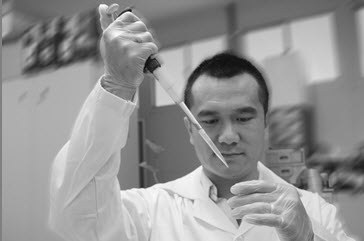侯建文 教授兼所長
Exercise training and hypoxia improve blood sugar and body composition
Skeletal muscle is the most important tissue for glucose uptake after meal. Thus reduced insulin sensitivity in skeletal muscle will lead to lower whole-body insulin sensitivity, and results in higher plasma levels of glucose, fatty acid, and amino acid. Recruitment number of muscle fiber is dependent on exercise intensity. Only recruited muscle fiber gains improvement in insulin sensitivity. Higher exercise intensity will cause more nutrients partitioning into skeletal muscle, and thus reduces nutrient supply to adipose tissue. Thus, exercise training will prevent fat accumulation in adipose tissue but cause muscle hypertrophy. Since fat cell is continuously signals skeletal muscle to adjust its fuel incorporation by controlling sensitivity to insulin, lower insulin sensitivity is typically observed in obese people than normal one. This feedback mechanism prevents endless storage of body fat in adipose tissue. In our group, we found that prolonged hypoxia training is able to significantly increase insulin sensitivity and reduce body fat in genetically obese animals. These animals are poor responder to exercise training in body fat reduction and improvement in glycemic control. Our result suggests a non-pharmacological option for those people with genetic predisposition in gaining fat.
Dr Chien-Wen Hou
姓名:
侯建文 教授兼所長
Name:
Chien-Wen Hou
現職:
臺北市立大學 運動科學研究所 教授
學歷:
國立體育大學運動生理學博士
研究領域:
運動營養學、低氧與醣類代謝
電子郵件:
om65726@yahoo.com.tw
電話:
02-2871-8288 ext. 5811
傳真:
02-2875-3383
地址:
111 臺北市士林區忠誠路二段101號
瀏覽數:
分享

